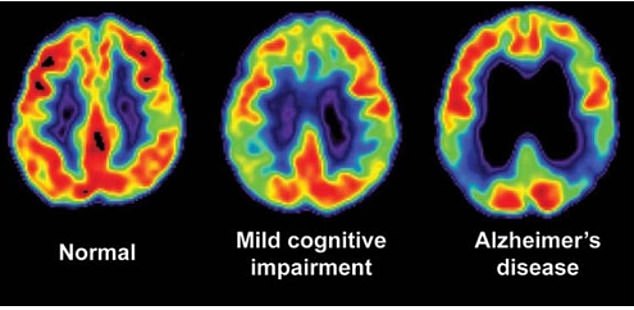Researchers intrigued by people with hallmarks of Alzheimer’s disease — but none of the symptoms — have probed their brains in the search for a cure.
They initially drew samples from the Netherlands Brain Bank, a repository of brains from more than 5,000 people who have died from a neurological disease.
They were startled when 12 of them showed Alzheimer’s disease markers but were still cognitively healthy.
They found that people with certain changes in their brains consistent with the disease showed key differences that could protect against Alzheimer’s.
Their research paves the way for more research into what exactly is behind the difference between the resilient group, as well as offers new clues for developing effective treatments.
Among thousands of donated brains sampled in the study, researchers found 12 people had signs of Alzheimer’s disease in their brains but no associated cognitive impairment. Structural and chemical changes in the brain, such as cell death, impact a person’s level of cognitive decline
Alzheimer’s affects roughly 47 million people worldwide and around 5.8 million in the US.
The American estimate is expected to rise in the coming years as the country’s population continues to age.
The Dutch researchers identified several differences among the brains of people with Alzheimer’s but no symptoms compared with those experiencing symptoms.
Those brains with the disease but no cognitive decline were called ‘resilient’.
Dr Luuk de Vries, first author of the study, said: ‘We think that genetics and lifestyle play an important role in resilience, but the exact mechanism is still unknown.’
Their hope is that additional research will uncover the specific genetic variants that may make a person more resilient to disease, which could guide researchers in developing highly targeted treatments that hone in on specific gene mutations.
Some gene mutations can influence certain processes such a energy production to power cells.
Dr de Vries said: ‘If we can find the molecular basis for resilience, then we have new starting points for the development of medication, which could activate processes related to resilience in Alzheimer’s patients.’
Genes may influence production of a protective antioxidant called metallothionein, which protects the brain from free radicals.
People with Alzheimer’s but no symptoms also had fewer immune cells that specifically target pathogens invading the central nervous system.
These cells become overactive when certain toxic proteins called amyloid beta and tau build up in the brain.
This drives inflammation which can damage nerve cells and cause brain tissue to shrink, both hallmarks of Alzheimer’s.
They also noticed key differences in the way proteins folded and clumped together in the people involved in the study who had symptomatic Alzheimers versus the asymptomatic ones with Alzheimer’s.
The team then found evidence that resilient brains might be better at clearing out toxic proteins and debris which can lead to brain shrinkage.
Most treatments of Alzheimer’s that have passed regulatory muster, such as Lequembi, target the aggregation of the amyloid proteins, but so far, none of them have been shown to cause significant improvement in cognitive function.
But better understanding the chemical underpinnings of cell death that leads to cognitive decline could give drug developers and researchers a new, better way to attack the biomarkers of disease, such as tau tangles.
Their research was published in the journal Acta Neuropathologica Communications .
Source: Mail Online
